FRONTIER CONTROLS
‘Its anti-migrant overtones are clear’ — critics wade into SA’s beefed-up border management
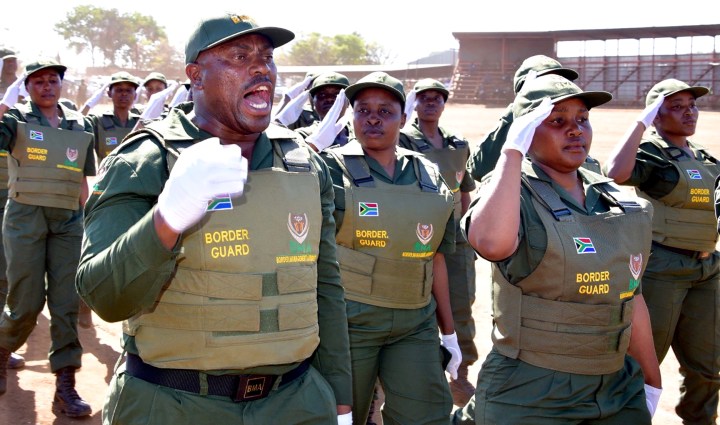
The Border Management Authority claims it’s beefing up control of SA’s borders, but critics say the agency represents the ongoing securitisation of migration, where foreigners are viewed as a threat rather than an opportunity.
The Border Management Authority (BMA) and South Africa’s immigration legislation have been under the spotlight after the BMA announced over the weekend that since 2 January, it had refused entry to South Africa to more than 4,000 people who it said did not have the requisite documentation.
Migration experts warn that this “success” points to South Africa’s rapidly changing migration policy, which is shifting to treat migration as a threat rather than an opportunity.
Recent South African policies have focused on slowing or halting migration, which mirrors what Australia and some countries in Europe are doing and is not necessarily in the best interests of Africa and South Africa, migration experts say.
The balance between border security, human rights and regional development is a critical issue, with experts calling for a comprehensive and nuanced approach that addresses the root causes of migration while respecting individual rights.
BMA’s festive season operations
In response to the surge in movement across borders over the festive season, the BMA, which has been operational since April 2023, initiated a comprehensive border control plan. The plan, which ends on 18 January, aims to manage the legitimate movement of people and goods while preventing the smuggling of illegal items or individuals.
As migrants who left the country at the start of the festive season are now returning, BMA commissioner Dr Mike Masiapato told Daily Maverick that illegal immigration was one of the BMA’s biggest challenges.
He highlighted three ports of entry where illegal immigration was of most concern:
- The leading port is Beitbridge and its corridor. Here, Masiapato said, they are dealing with Zimbabweans as well as people from other African nations, including Malawi, Zambia and the DRC. “So this is where we have the majority of the illegal migrants that we deal with.” Since 2 January, 488 individuals were intercepted at Beitbridge for allegedly entering SA illegally, said the BMA;
- The border with Lesotho; and
- The port of entry from Mozambique.
“The way in which we intercept them is that we have intensified our deployment on the north gate at the Beitbridge border post,” Masiapato said.
“Meaning that only those people who have the requisite documents are allowed into the port environment for them to be processed. Those who do not have the correct documentation are then intercepted and then from there, we actually returned them back to the Zimbabwean side.”
Giving insight into last week’s activities at the Beitbridge border post, Masiapato said on Sunday that in the previous 24 hours, the BMA had processed about 25,000 individuals coming into South Africa, and from 1 January to 7 January, it processed around 119,000 people at the border post.
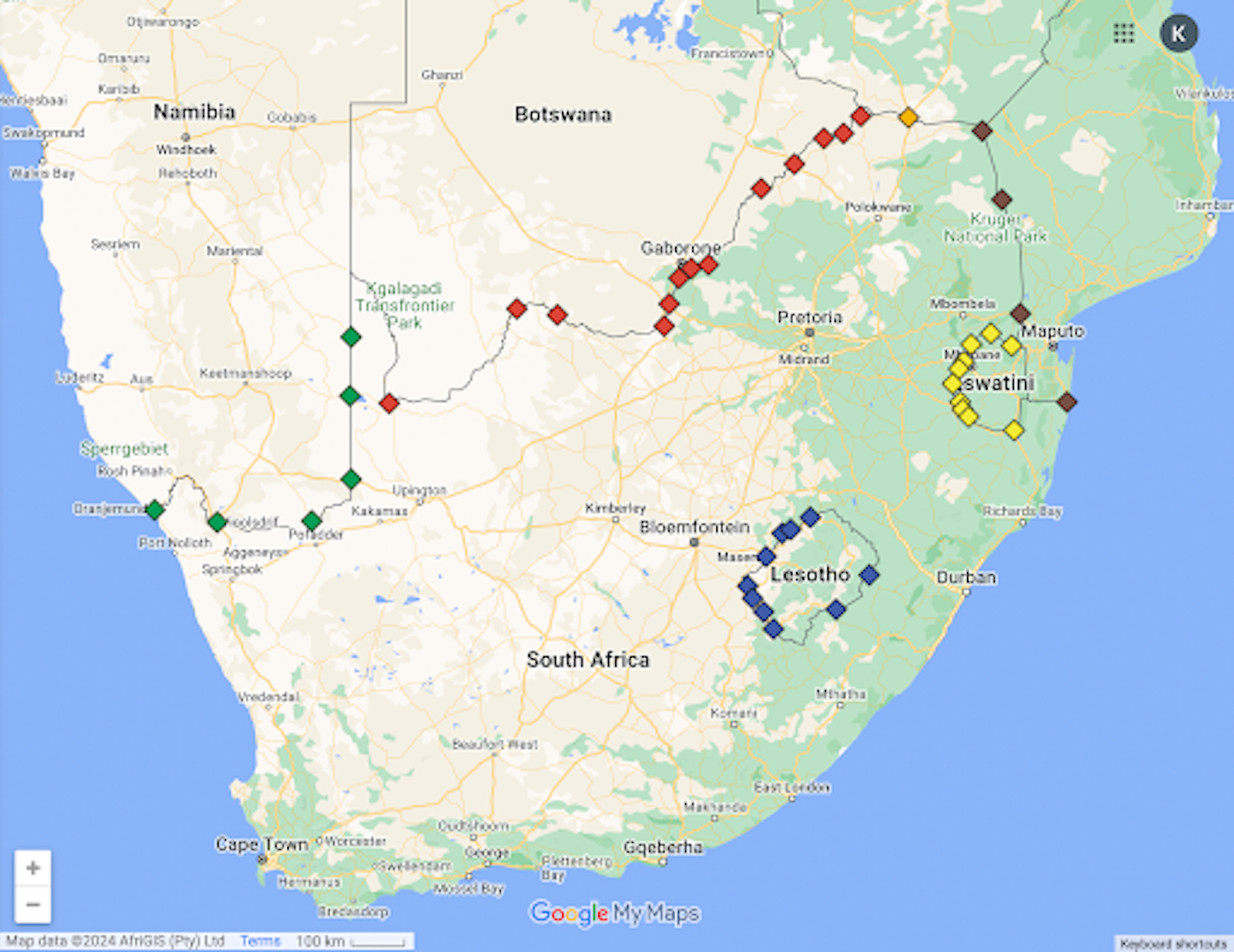
‘Anti-migrant overtones are clear’
The legislation behind the BMA, the Border Management Authority Act, was passed in 2020 and established a single authority responsible for overseeing every facet of the border environment, with border functions centralised under the Department of Home Affairs.
The legislation also mandates collaboration with other government entities and border communities to address issues related to border security, immigration control and customs enforcement. To achieve this, the BMA was established to coordinate and manage SA’s borders more effectively.
In a 2020 article, Ottilia Anna Maunganidze and Aimée-Noël Mbiyozo, from the Institute for Security Studies (ISS) said that although the statute mandates BMA officers to uphold fundamental human rights — including giving succour to victims of human trafficking, refugees and asylum seekers — there were concerns about their expanded powers due to Home Affairs’ dismal performance in handling xenophobia.
Maunganidze and Mbiyozo said the BMA was the latest in a series of regressive measures that negatively affect African migrants.
In January 2020, amendments to the Refugees Act increased the probability of asylum seekers and refugees being unlawfully detained in SA and deported. In May 2020, the Portfolio Committee on Home Affairs heard presentations on establishing one-stop border posts and processing centres for refugees near the borders which will inevitably prejudice asylum seekers.
“While the [BMA Act] purports to address other national security concerns, its anti-migrant overtones are clear. Throughout BMA debates, members of Parliament and the Home Affairs minister disproportionately focused on irregular migration. Highly inaccurate cause-effect statements blamed rampant xenophobia in South Africa on a lack of border management,” said Maunganidze and Mbiyozo.
Migration experts told Daily Maverick that South Africa’s borders are being militarised, which will block the African Union’s progressive border policies, free commerce and unrestricted mobility.
Read more in Daily Maverick: Buses, Beitbridge and border control — examining the Border Management Authority’s recent ‘trafficking success’
Masiapato explained that the BMA Act had enabled them to implement an integrated border management platform with a single command and control. All the individual specialised groups who used to work at the port representing their individual government departments moved out of those departments into the BMA.
“The biggest challenge we have is the fact that this area of work — border management — has been neglected for a long time, so there hasn’t been much investment in this space. Even after we did the integration of all the officials, each and every department demonstrated serious incapacity, when it comes to human resources and the entire tools of trade.
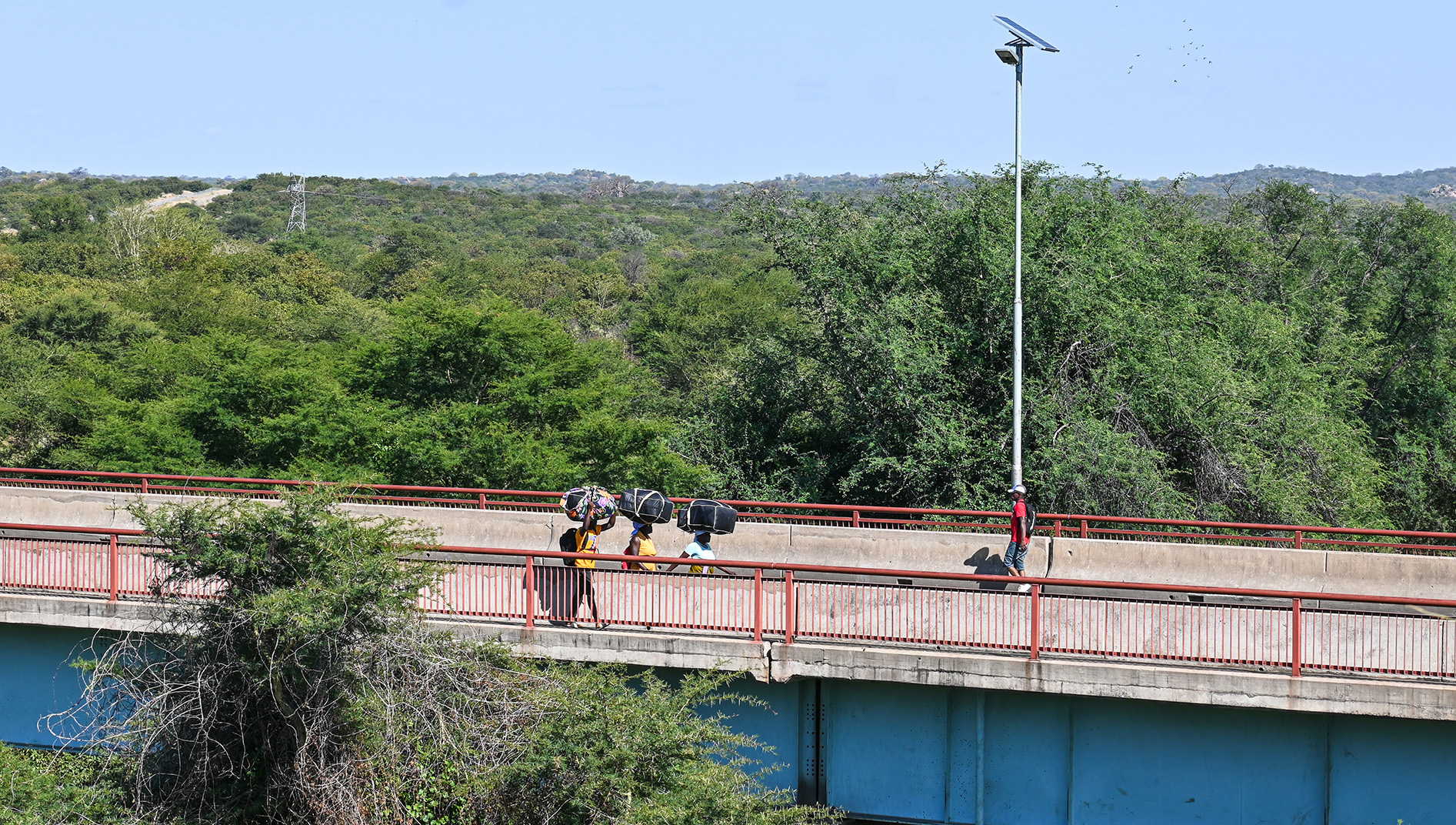
Traders carry goods across the Beitbridge Border Crossing between South Africa and Zimbabwe. (Photo: Amnesty International)
“All of those issues remain the problems of BMA… We need to get additional financial allocations so that we can capacitate BMA in the current financial year before we enter into the festive period of 2024/2025,” he said.
In Parliament in October, Masiapato outlined the BMA’s second-quarter performance report for the 2023/24 financial year, stating that it had achieved 10 of 13 targets (77%) and spent 44% of its R1.1-billion allocated budget, R963-million of which was allocated to pay employees.
The BMA Act and the BMA are part of an attempt by the government to crack down on what supporters describe as uncontrolled immigration and the manipulation of the asylum system.
The Department of Home Affairs (DHA) has recommended a radical revision of the nation’s immigration laws through a white paper, which was released for public feedback in November and is open for public comment until 19 January.
The White Paper on Citizenship, Immigration and Refugee Protection: Towards a Complete Overhaul of the Migration System in South Africa seeks an overhaul of the Citizenship Act, Immigration Act and Refugees Act. It contains significant policy changes that could place more stringent requirements on foreign nationals seeking citizenship and permanent residency.
Read more in Daily Maverick: Civil society slams ‘poorly drafted’ White Paper on Citizenship, Immigration and Refugee Protection
Masiapato said the BMA had been trying to do things differently to combat historical challenges and threats in the border management environment by preventing corruption and implementing drone monitoring and body cameras.
Addressing the challenges
“There are people who are looking at the historical challenges of border management, and then rubbish the existence of the BMA, which is very unfortunate. Indeed, we had porous borders, we had corruption at the ports, and had all of these sorts of challenges. Now we have a new authority created to start addressing these challenges.”
He said they were procuring body cams for every BMA official, which will be centrally controlled, and obtaining drones to help monitor activities along the border.
“These drones will be able to help us; all of these things are what we are bringing into the space to deal with border management issues.”
Masiapato said the BMA had increased the number of officers at ports of entry so immigration officials would “no longer be exposed to people without documents, because it was those people that were corrupting them.
“There is no way that you can go to an immigration official with a valid passport and pay a bribe… When people were just walking into the port environment without documentation, they made bribes and then they came through on the other side. That was our problem. So we started doing things differently to address these issues.”
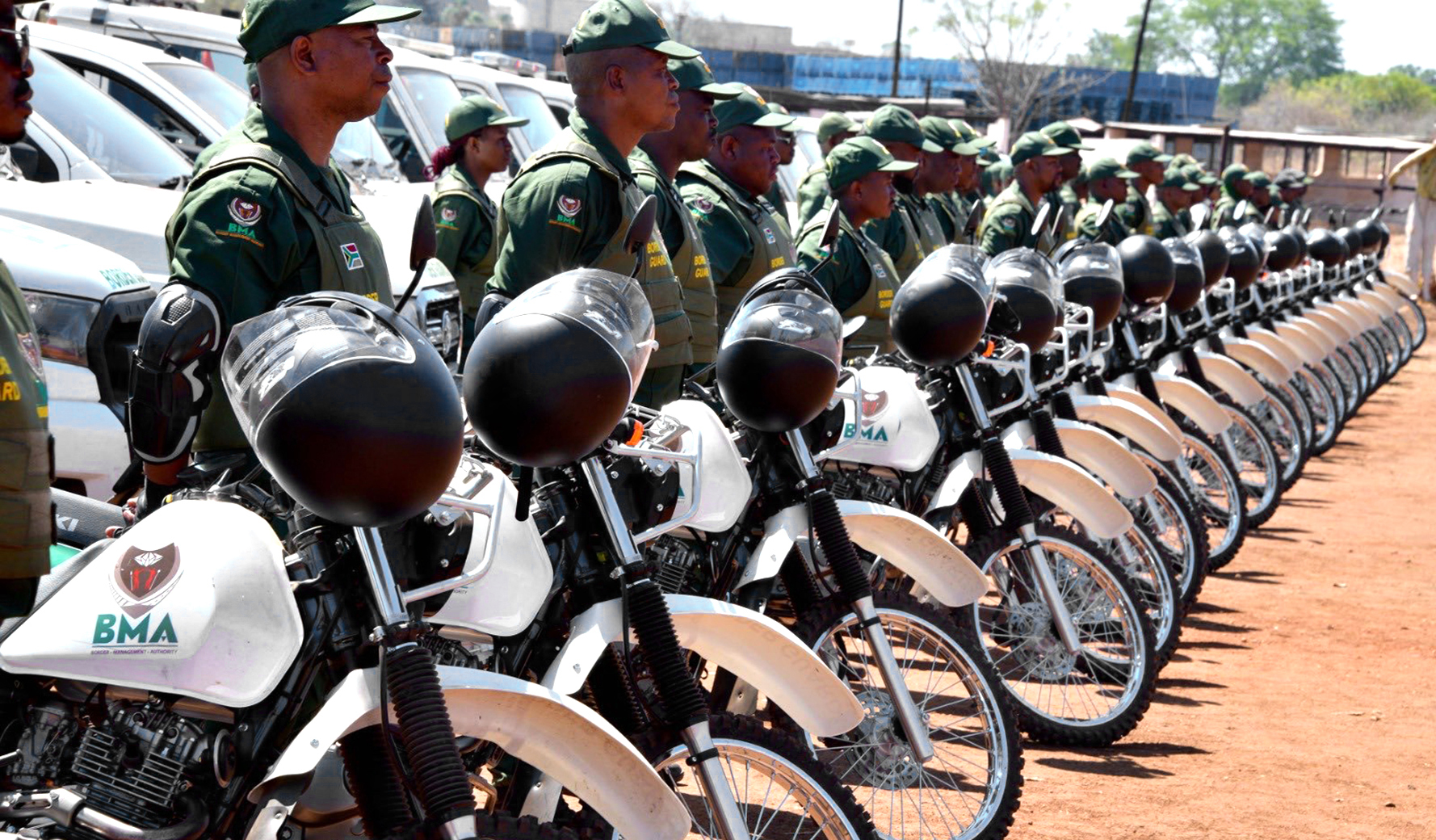
The newly launched Border Management Authority is aimed at ensuring an integrated response to deliver effective and efficient border management. (Photo: @PresidencyZA / X, formerly Twitter)
However, Mbiyozo, from the ISS, told Daily Maverick such an approach removes the blame for border corruption from Home Affairs. Instead, it blames those seeking passage, when more likely than not it is officials in power who would be the ones taking advantage of vulnerable individuals at the borders.
In addition, Mbiyozo said, “We cannot suddenly pretend that civil registration in South Africa or neighbouring countries is perfect and that only people with valid passports should be allowed.”
‘What exactly is the problem?’
Regarding the increased focus on illegal migrants, Loren Landau, a migration and development professor at the University of Oxford and University of the Witwatersrand, asked:
“What challenge is illegal immigration posing to SA? What is the threat? What exactly is the problem that we are trying to solve? And is the proposed cure any better? What the government is doing has high costs in terms of finance, trade and human rights. Will it make SA more prosperous or safer? Almost certainly not.”
Landau said the best way to address illegal immigration was to ensure people could migrate legally.
“That is absolutely not what is happening. What is the problem we are trying to solve here? If it’s about criminal networks and smuggling, then there are better ways to address this through intelligence and cross-border investigations.
Read more in Daily Maverick: Motsoaledi advocates for review and temporary withdrawal from two international agreements on refugee protection
“If it’s about the labour market, then workplace inspections and employer sanctions are the way to go. If it is simply about not wanting foreigners in the country, then we should just own up to that.”
Landau believes the BMA and its associated regulations represent a dual move in migration policy: the first is to the technocratic “management” of migration involving the increased use of technology, targets and interagency cooperation, which has the potential to become repressive and coercive.
The second trend is the securitisation of migration, which shifted the discussion of migration from an issue of rights, development and international cooperation to one of threat.
“What we’ve seen globally — in the USA, the EU, and elsewhere — is that heightened official restrictions often give rise to enhanced smuggling and trafficking networks. While these already exist in SA, they are relatively peaceful and secure. These are likely to become more violent and corrosive as people continue to seek ways into South Africa,” Landau warned.
Mbiyozo added: “There’s a history of over-problematising irregular migrants… At the centre of all migration into SA, the overwhelming majority of people coming are from our neighbouring African countries and they’re mostly low-skilled people just looking for work.”
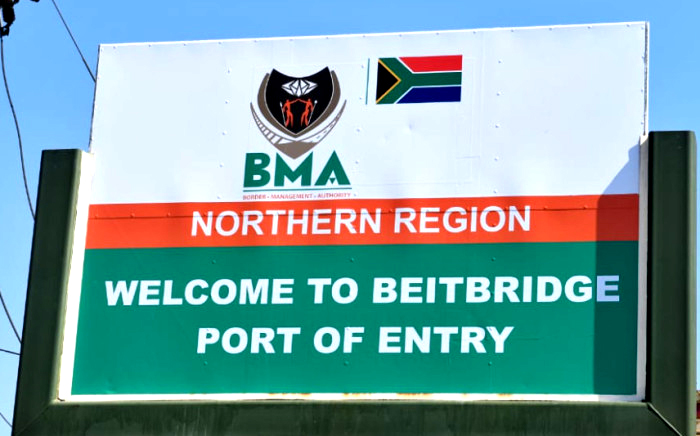
(Photo: @PresidencyZA / formerly Twitter)
“Evidence shows that undocumented migrants help grow the domestic and regional economy, and no evidence links them disproportionately to crime. The DHA’s efforts to problematise these migrants have increased alongside xenophobic rhetoric from politicians and violence against foreigners,” she said.
Mbiyozo said that 20 years ago, the immigration policy platform in SA was more pan-African and that this was now fading, especially after the new white paper.
Read more in Daily Maverick: Border Management Authority’s claims of ‘human trafficking’ of children across Beitbridge border appear unfounded
Once fully operational, the BMA is expected to cost R10.3-billion annually. Mbiyozo asked whether this would achieve as much as investing in housing, education, health, public safety or police reform.
In addition, Mbiyozo questioned whether Home Affairs was in the best position to manage the BMA.
“Why is Home Affairs, which issues pension cards and birth certificates, now [managing] soldiers? Home Affairs doesn’t have a great record of efficiency and discipline, yet they’re now overseeing other ministries and departments.”
However, Mbiyozo said that if South Africa was, through the BMA, moving people more quickly, efficiently and safely through its borders, along with facilitating free trade, then that was great but all due processes needed to be made transparent.
“Having good efficient checkpoints along the way are good to protect against crime and unsavory things but … a lot of it depends on how it’s implemented… I want people to really look at the information that’s come out [from the BMA],” she said. DM


















 Become an Insider
Become an Insider
cry louder so-called experts
Professor Loren Landau can go live in Hillbrow for just a week and then answer that question again.
Spot on. He can then redo the entire interview after a month of living in Vannin Court in Hillbrow.
This article seems to suggest that there should be no attempt to protect and control our borders.
So called refugees enter the country and over the holiday period return to their country of origin to visit. If you are a refugee how are you able to return home for a visit?
Unchecked entry of undocumented migrants is a problem as there is no record of them. In desperation they have to resort to crime. They overburden our social services which are already in a pathetic state.
Our own poor citizens suffer as a result of this.
However this does not mean that foreigners are not welcome at all. If they have special / scarce skills they should go through a screening process like in most other countries before they are admitted. Most other countries require you to prove that you have a reason amount of money to sustain yourself before being allowed to enter the country.
We need to implement systems to manage these requirements. If nothing is done then nothing will change. References to faceless “experts” also do not help
Kristin, like Nicholas Crisp, missed the point …… in South Africa theoretical results and the actual result are different. No matter what law, rule or system the civil servants manage, their main purpose is to create a method of personally making cash for themselves by ‘facilitating’ a positive outcome or complicating the procedure, for the person affected. Whatever the supposed outcome was meant to be, it will be circumvented or manipulated for personal gain by the civil servants and their partners.
Any country’s first responsibility is to it’s own citizens and not to refugees and work seekers from other regions. That said it is important that xenophobia is not allowed to control the actions of those responsible for maintaining the integrity of the country’s borders.
There is zero correlation between effective border control and legal migration.
Immigration policy: should be carefully designed to optimize desirable people movement.
Border control: should prevent people from entering our country illegally.
Careful, they’ll be calling you Trump any minute now
A complete waste of resources that’s being done for purely political reasons with no long term benefits for South Africa. When a country begins to blame its neighbors for all it’s ills, such a country is in decline. Like it or not, here in Southern Africa, we are bound together by history, by geography, by language, by a common future and by blood. Any law that purports to legislate on these matters should recognize these realities.
Zimbabwe has always had an anti-immigration stance, yet you expect SA to have open borders. Open borders work when there is relative equilibrium among states. Zimbabweans ought to focus on developing the country to equal if not better status then SA, then we can have open borders. For now, you are making excuses to take advantage of SA, because you do not have the capacity and will to turn Zimbabwe into the nation it is capable of being. You spend too much time obsessing about what SA should do for you.
I have written a research that has found illegal migration to be a big problem in SA. It impacts the provision of government services and undocumented people are a burden to the state in many respects. Those who promote unregulated influx of foreign nationals may be beneficiaries of the problem that compromises the national security of South African, especially the poor
Our fellow Africans, Zimbabweans in particular, love to speak of open borders, shared histories and what not. However, from the time of independence, none of these nations have implemented open borders. Yet they expect SA to open its borders to all. This is obviously about taking advantage of the social systems SA has. Where have you heard of refugees who are building homes back in their countries, and go home on holidays. It’s expensive, not to mention counterproductive, for the SA taxpayer to have to carry people who have no interest in their own nation’s development. They are not here to contribute to SA’s development, they are here to take as much as they can at our expense.